9 Best Supplements to Add to Your Smoothies

Full of fiber, vitamins, and minerals, fruit and vegetable smoothies make an excellent addition to your diet. But to make the most of your smoothies, you may want to consider adding supplements that boost your health.
“You can consume these all outside of a smoothie, but I personally love upgrading a smoothie and getting in a bunch of essential supplements at once without having to take a handful of pills,” says Maggie Berghoff, FNP, a functional medicine nurse practitioner, wellness entrepreneur, and author of the best-selling book Eat to Treat. “You can’t taste the additions, and I love knowing my smoothie is jam-packed with benefits!”
Ready to take your smoothie to the next level? These are the eight best supplements to add for optimal nutrition.
RELATED: 10 Best Foods to Eat in the Morning for a Faster Metabolism, Nutritionists Say.
1
Protein powder

The most popular smoothie addition, available at most smoothie shops, is protein powder.
“Protein is needed for muscle repair and growth and adding protein powder to a smoothie is an easy way to meet your daily protein needs,” says Chris Mohr, PhD, RD, a fitness and nutrition advisor at Fortune Recommends Health.
Kimberly Wiemann, MS, RDN, CDN, a registered dietitian and nutrition consultant for Consumer Health Digest, says protein powder comes with some lesser-known benefits, too.
“It also helps to balance out the grams of carbohydrates that are likely already a part of the smoothie. Combining macronutrients like protein along with carbohydrates helps to slow the absorption of sugars into the bloodstream which can not only help to stabilize blood sugar levels in those with diabetes, but can also help people stay full for a longer period of time,” she tells Best Life.
“Whether you’re an avid athlete, an aging adult, someone who just had surgery, or maybe you’re trying to lose weight, it’s imperative to meet your protein goals in order to preserve healthy, lean body mass,” agrees Elizabeth Brown, MS, RD, CPT, a registered dietitian and certified holistic chef who goes by The Kitchen Vixen.
“Aim for 75-100 percent of your body weight in ounces. For example, a 140-pound woman should aim for 105-140 grams of protein per day,” Brown recommends. “A scoop of protein powder might contain 20-30 grams per scoop, helping you get closer to your daily goal.”
2
Omega-3 fatty acids
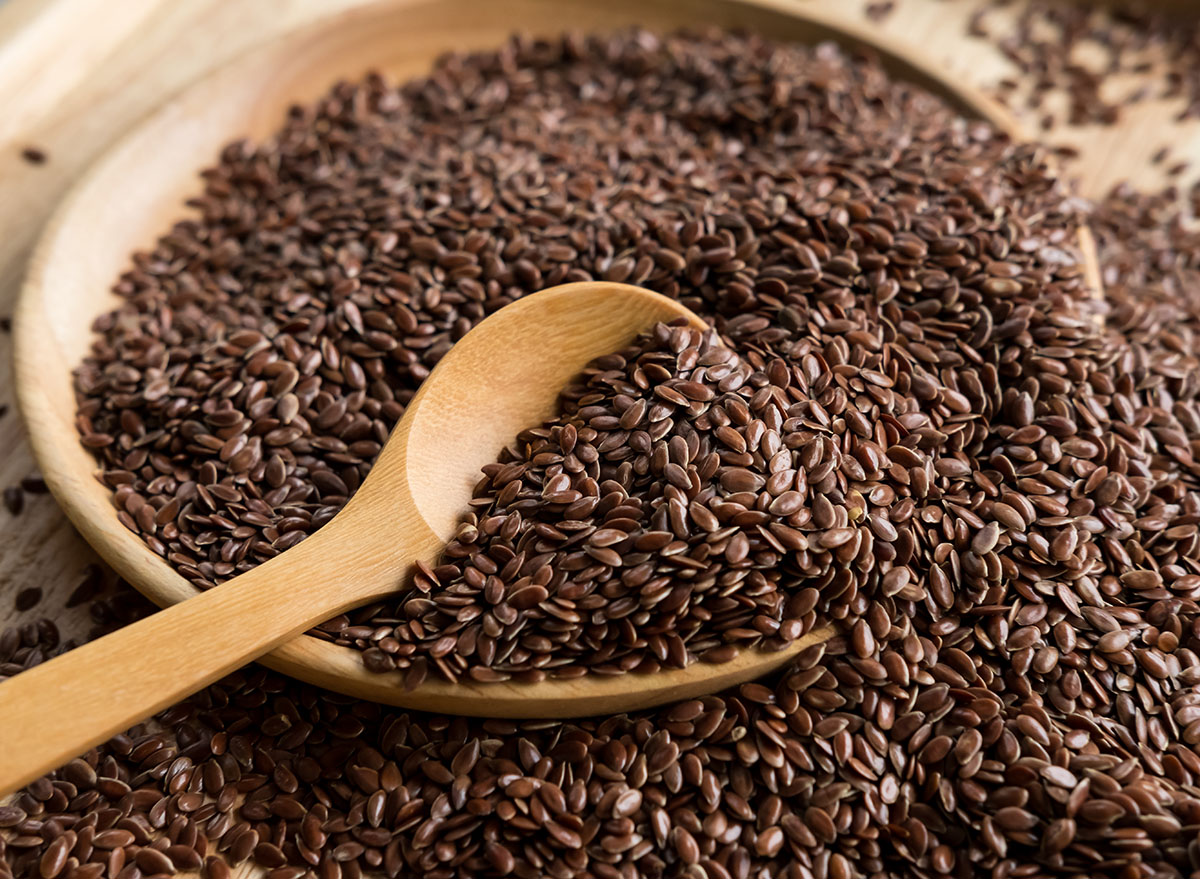
According to the American Heart Association (AHA), most Americans aren’t getting enough omega-3 fatty acids in their diets. That’s why these make for another great supplement to incorporate into smoothies.
“These are found in fish oil or algae oil for those who don’t eat fish,” says Mohr. “These offer the omega-3 fats, EPA and DHA, which are particularly beneficial for heart and brain health while playing a role in managing inflammation.”
He recommends adding ingredients like flax, hemp, or chia seeds, which contain a different type of omega-3 “but are even better as a source of fiber and other important nutrients.”
Wiemann suggests grinding up these additions before adding them to your smoothies. “When flax seeds are ground, they will unlock all of their health benefits. If flax seeds are not ground, they will likely pass straight through the digestive system without releasing all their health benefits,” she explains.
RELATED: 7 Best Protein Supplements for Weight Loss, According to Dietitians.
3
Greens powders
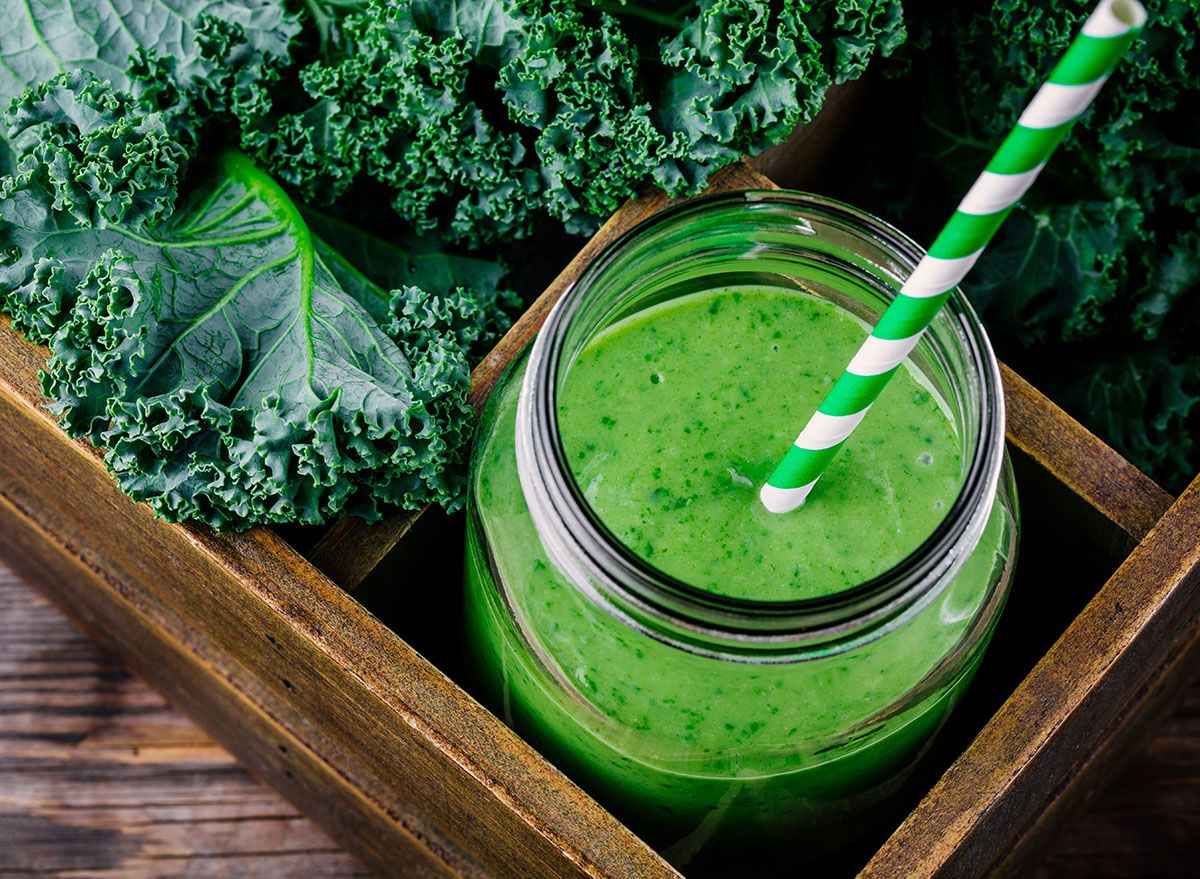
Adding leafy greens such as spinach or kale to your smoothie can greatly alter the flavor and consistency. If you’re looking to gain some of the benefits without changing the taste, greens powders can help.
“Greens powders usually contain a blend of greens like spinach, spirulina, kale, and chlorella,” says Mohr. “They are often rich in minerals, vitamins, phytonutrients, and antioxidants which could help complement a quality diet to help fill nutrient gaps.”
4
Probiotics

Adding a probiotic to your smoothie is a great shortcut to good gut health, the experts say.
“Probiotics are bacteria that are beneficial to your gut health and immune system. While adding a probiotic supplement to a smoothie isn’t a replacement for adding them naturally through fibrous fruits and veggies and fermented foods, it could be a solid complement to doing both,” notes Mohr.
Berghoff says she regularly puts probiotics in her own smoothie blends. “I personally don’t love taking tons of supplements, yet I know how powerful probiotics are, so I love to add a flavorless probiotic powder to my smoothie,” she says.
RELATED: 5 Best Anti-Aging Supplements, According to a Doctor.
5
Fiber
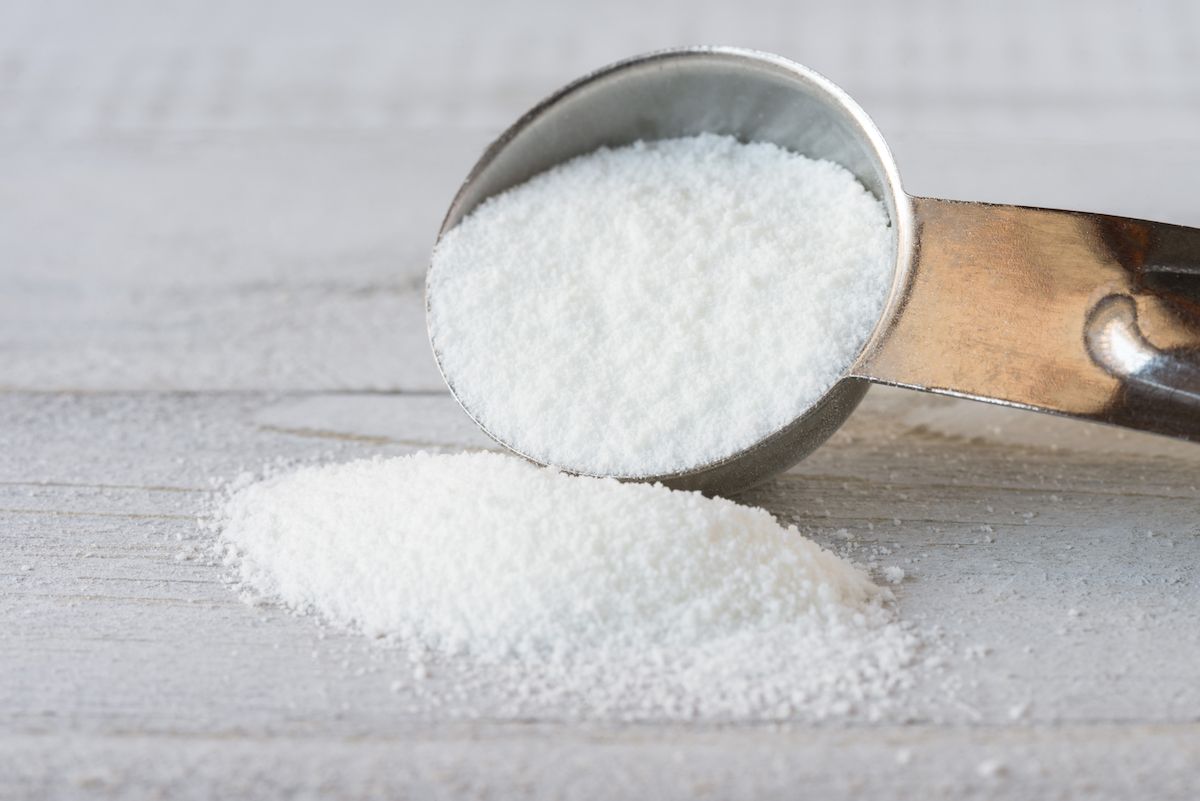
One of the most beneficial things about smoothies is their high fiber content. If you want to double down on the benefits, Mohr says you can add a powdered fiber supplement.
“Fiber is needed for good digestive health and regulating blood sugar. Adding fiber supplements to smoothies can help with digestion and help with feeling fuller for longer,” he says.
“Consuming fiber in a smoothie can be beneficial to those who need help meeting their daily fiber requirements, which is most of the US population, as fiber is considered one of the ‘shortfall nutrients’ most under consume,” Mohr adds.
6
Collagen

Collagen peptides have a range of health benefits, including improving skin and bone health. When natural collagen levels are low, you may notice more outward signs of aging, such as skin wrinkling and sagging, and internal signs of aging, such as aching joints and bones.
“As we age, collagen production naturally decreases, but there are some real benefits and data to support collagen inclusion for hair, skin, and joint health,” says Mohr.
7
Green tea extract or matcha
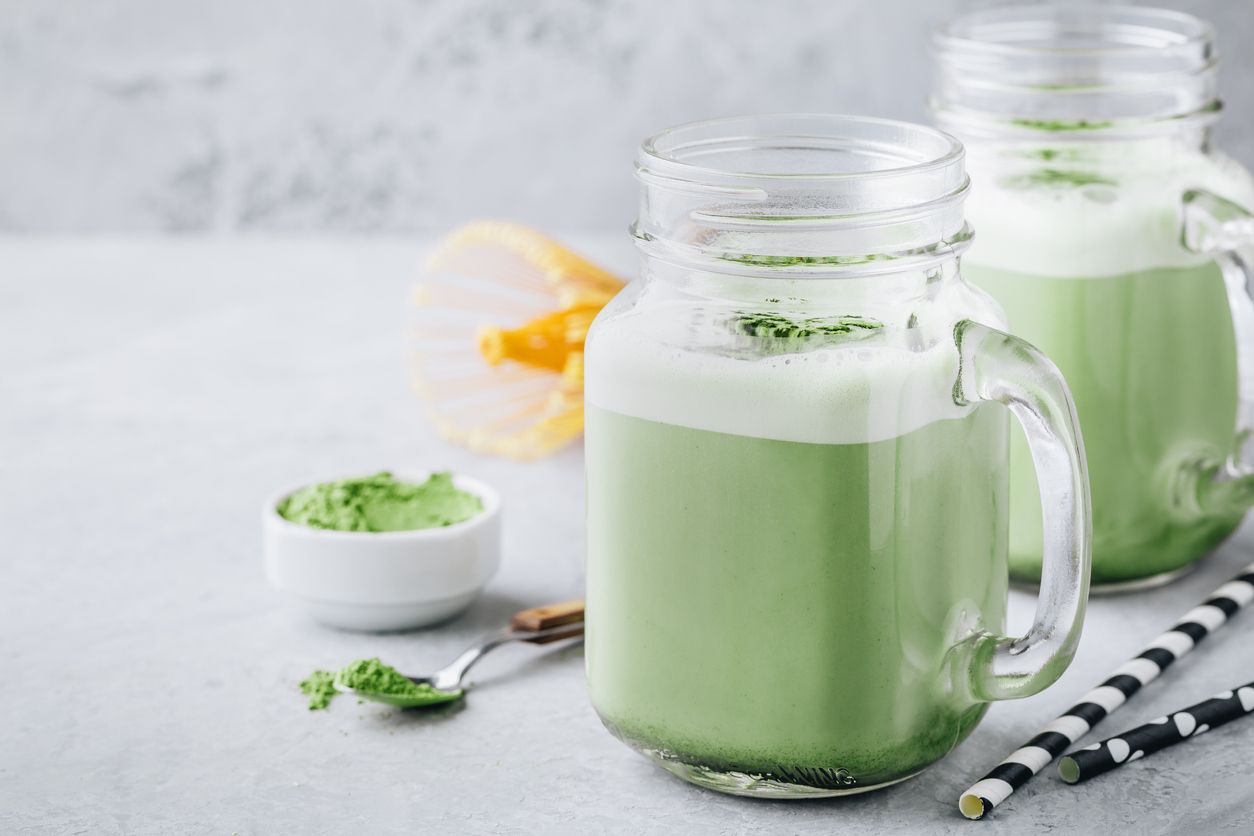
Green tea extract can improve inflammation, lower your blood pressure, and help you manage your weight.
Though some people prefer green tea extract in liquid form, Wiemann recommends trying matcha, a plant compound found in green tea that shares many of its benefits.
“Matcha can be a great addition to a smoothie because the fruits can hide the flavor that some people do not care for, all while adding a tremendous amount of antioxidant power,” she says.
RELATED: 10 Supplements That Actually Help You Wake Up in the Morning.
8
Vitamin D3+K2
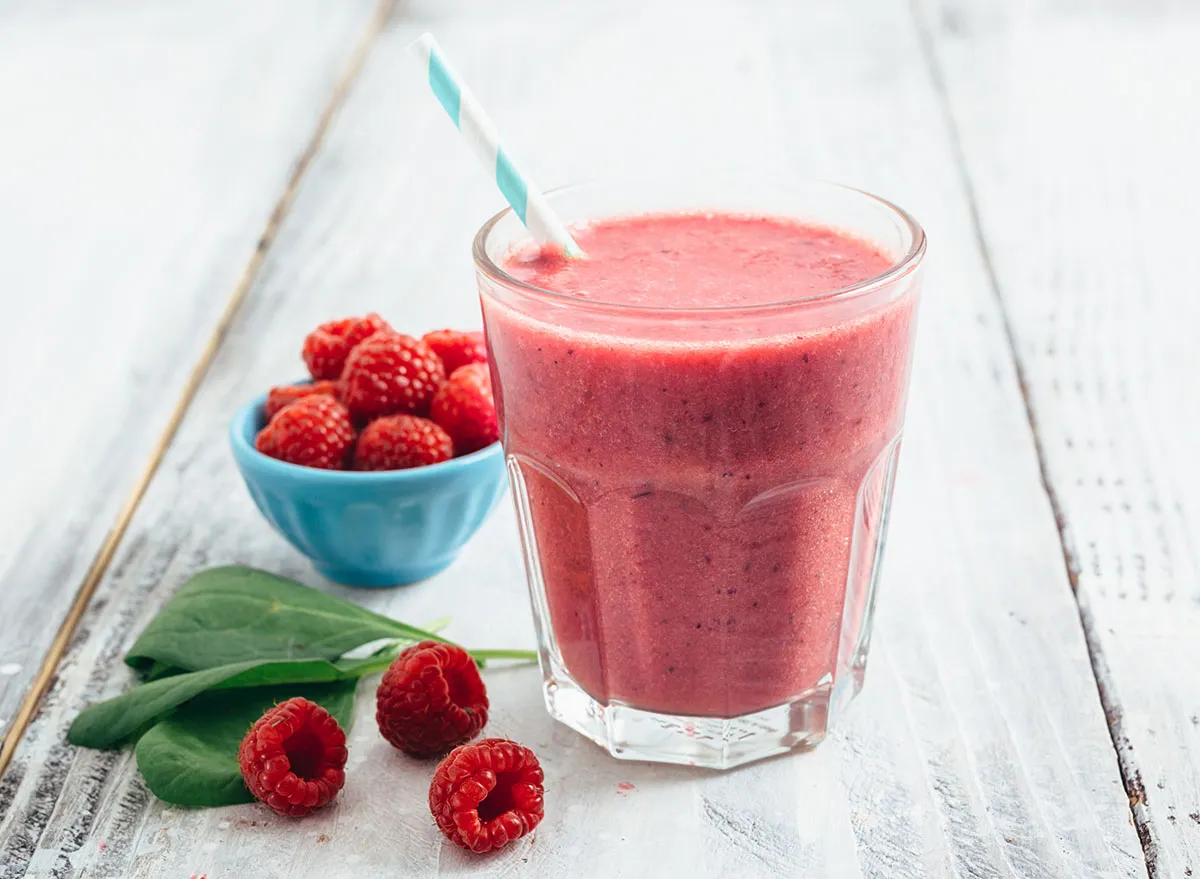
Many people are deficient in vitamin D3, and Bergoff points out that opting for a blend of vitamins D3 and K2 can help to optimize absorption and help move calcium to the bones.
“This vitamin is essential for most everyone,” notes Berghoff. “It impacts mood, immunity, bone health, and overall health.”
9
Inulin
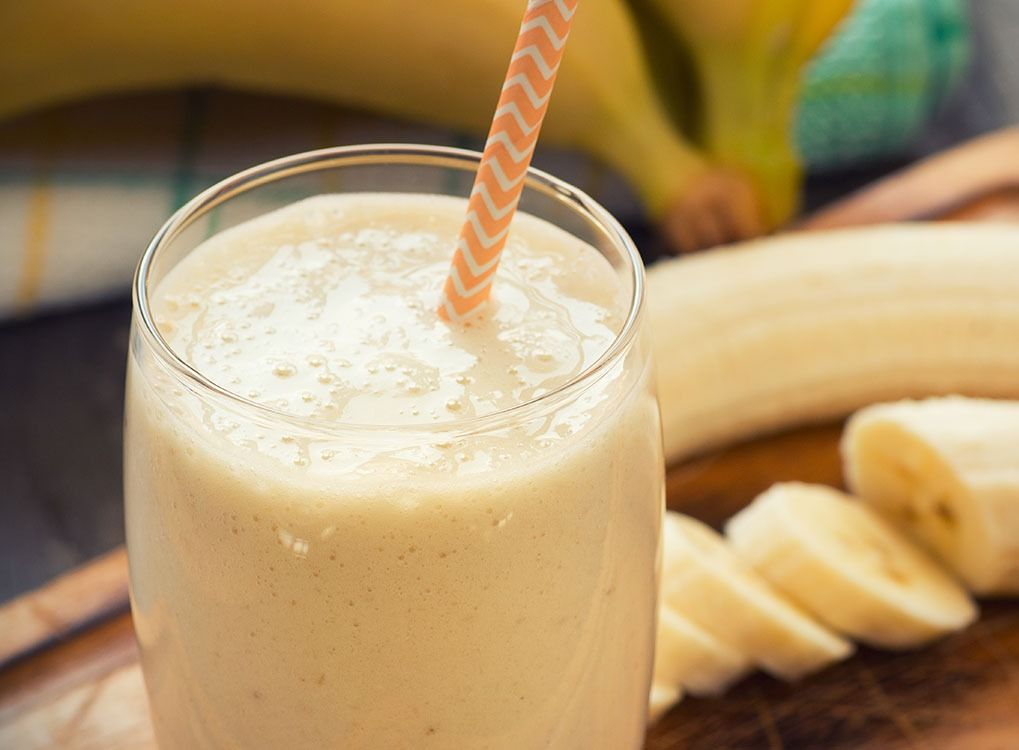
Finally, Berghoff recommends adding inulin powder, which is a type of prebiotic that can be found naturally in a range of fruits and vegetables including bananas, wheat, onions, leeks, artichokes, and asparagus.
“Inulin is a powerful supplement that has a slew of health benefits. I love it for the lowering of blood sugar, reduction of inflammatory factors, improved gut health, and decrease in the ‘bad’ LDL cholesterol,” says Berghoff. “It also has a positive impact on metabolism, mood, and weight loss.”
Best Life offers the most up-to-date information from top experts, new research, and health agencies, but our content is not meant to be a substitute for professional guidance. When it comes to the medication you’re taking or any other health questions you have, always consult your healthcare provider directly.